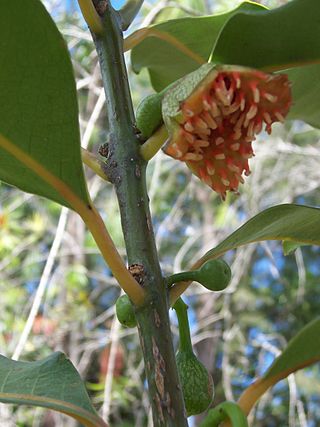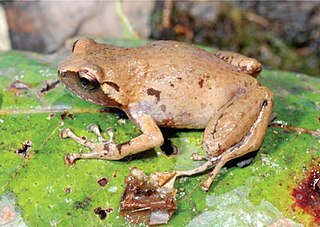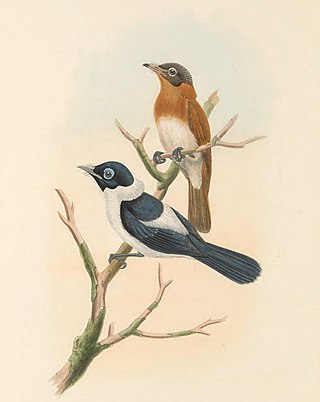
Oryza is a genus of plants in the grass family. It includes the major food crop rice. Members of the genus grow as tall, wetland grasses, growing to 1–2 metres (3–7 ft) tall; the genus includes both annual and perennial species.

Bandicoots are a group of more than 20 species of small to medium sized, terrestrial, largely nocturnal marsupial omnivores in the order Peramelemorphia. They are endemic to the Australia–New Guinea region, including the Bismarck Archipelago to the east and Seram and Halmahera to the west.

The Guinea national football team represents Guinea in men's international football and it is controlled by the Guinean Football Federation. They have never qualified for the FIFA World Cup finals, and their best finish in the Africa Cup of Nations was runners-up in 1976. The team reached the quarter-finals in four recent tournaments. The team represents both FIFA and Confederation of African Football (CAF).

The Monimiaceae is a family of flowering plants in the magnoliid order Laurales. It is closely related to the families Hernandiaceae and Lauraceae. It consists of shrubs, small trees, and a few lianas of the tropics and subtropics, mostly in the southern hemisphere. The largest center of diversity is New Guinea, with about 75 species. Lesser centres of diversity are Madagascar, Australia, and the neotropics. Africa has one species, Xymalos monospora, as does Southern Chile. Several species are distributed through Malesia and the southwest Pacific.

Pandanus is a genus of monocots with about 578 accepted species. They are palm-like, dioecious trees and shrubs native to the Old World tropics and subtropics. The greatest number of species are found in Madagascar and Malaysia. Common names include pandan, screw palm and screw pine. They are classified in the order Pandanales, family Pandanaceae.

Casuarina, also known as she-oak, Australian pine and native pine, is a genus of flowering plants in the family Casuarinaceae, and is native to Australia, the Indian subcontinent, Southeast Asia, islands of the western Pacific Ocean, and eastern Africa.

Oreophryne, the cross frogs, is a genus of microhylid frogs. They are found in the southern Philippines, Sulawesi and the Lesser Sunda Islands, and New Guinea and New Britain.

Goodfellow's tree-kangaroo, also called the ornate tree-kangaroo, is an endangered, long-tailed mammal native to rainforests of New Guinea. Like most tree-kangaroos, it lives in the treetops and feeds on leaves or other plant matter. It belongs to the macropod family (Macropodidae) along with kangaroos, and carries its young in a pouch like other marsupials. Its main threats are habitat loss and hunting. There are two subspecies: D. g. goodfellowi and D. g. buergersi.

Protemnodon is an extinct genus of megafaunal macropodids that existed in Australia, Tasmania, and New Guinea in the Pliocene and Pleistocene. Members of this genus are also called giant kangaroos.

The frilled monarch is a species of bird in the family Monarchidae. As currently defined, its range is restricted to forest on New Guinea and nearby smaller islands, but historically it has included some or all of the remaining members of the genus Arses as subspecies.

Distipsidera is a genus of tiger beetles. There are about 12 described species in Distipsidera, found in Oceania.
Celaenephes is a genus in the ground beetle family Carabidae.
Ectenognathus is a genus in the ground beetle family Carabidae. This genus has a single species, Ectenognathus dryptoides. It is found in the African countries Guinea, Ivory Coast, Togo, and Nigeria.

Epigraphus is a genus in the ground beetle family Carabidae. There are about seven described species in Epigraphus, found in Africa.
Colpodichius is a genus in the ground beetle family Carabidae. This genus has a single species, Colpodichius platyderoides. It is found in Guinea and Ivory Coast.
Crenulostrigus is a genus in the ground beetle family Carabidae. There are at least two described species in Crenulostrigus, found in Africa.
Drymonaxus is a genus in the ground beetle family Carabidae. This genus has a single species, Drymonaxus feanus. It is found in Equatorial Guinea.
The Papua New Guinea Rugby Football Union, or Rugby PNG is the governing body for rugby union in Papua New Guinea. It was established in 1962 and was affiliated to the International Rugby Board in 1993.

Mount Shungol is an ultra-prominent summit to the west of Lae, in Morobe Province, Papua New Guinea. It is in the Herzog Mountain Range and has an elevation of 2,752 metres (9,029 ft). The Buang people claim ownership to the top of Mount Shungol.












